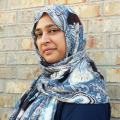I am an American Muslim woman, one who has dedicated her life to bringing people of faith together for a better America. I’m not the only one doing so across faith and gender lines — I know hundreds, if not thousands, of interfaith and social justice activists working tirelessly to make our communities less prejudiced and more tolerant.
Yet things seem to be getting worse, not better, for Muslims in America. A recent poll examining incidents of hate crimes against Muslims shows that 2015 was the worst year for American Muslims since Sept. 11, 2001. These hate crimes run the gamut from verbal assaults to property vandalism, physical assaults, and even murder. My own state of Texas is second on the list of states with the highest incidences of hate crimes. I worry about the effect on my children, about my friends walking on the streets of Houston, about my broader faith community and what they potentially face every single day.
But I am also galvanized every single day to go out into my neighborhood, contact community organizations, and even offer to train local law enforcement. It’s the reason for my activism, which spans blogging, speaking, and training.
People often ask me why I do what I do — whether I am scared of potential threats, or if my public life weighs over my private one. My response will always be the same: I have no choice. I owe it to my children, and the children of all those who live in this great country.
Sadly, some think this is a problem only Muslims must address. They forget that Muslims are as American as anyone else. We are a part of American culture and life as much as Christians, going back to the Muslim slaves who helped build this nation with their blood, sweat, and tears. The root causes of Islamophobia are intolerance and misinformation, causes that come in all sorts of ugly packages like anti-Semitism, religious bigotry, sexism, and even racism. Islamophobia is just one way that our own insecurities, fueled by bigotry and a lack of information, come back to haunt us in a very real way.
American Muslims cannot and should not take on the task of addressing anti-Muslim sentiment by themselves. Our Christian friends, neighbors, and community members must be equal partners in this fight against intolerance.
And I have learned that much of what I envision — different faiths living together in love and harmony — can be accomplished by learning more about Muslim Americans.
When we consider that Islamophobia comes mainly from misinformation — like the incorrect claims that the Quran sanctions violence against innocent people, or that the Prophet Muhammad commanded his followers to commit crimes against others — it becomes imperative that one gets actual facts from actual Muslims, rather than from the news or from so-called terrorism experts.
Meet some Muslims, and ask your burning questions. It may seem impossible, but I have seen it work wonders.
So how does one actually go about learning more about Muslims? Here are three ways:
1. Join an interfaith discussion group.
Most cities have interfaith discussion groups to visit with people of different faiths coming together to talk and share. If there are no groups in your area, you can create your own, inviting your friends, neighbors, or co-workers to join.
A great form of interfaith discussion is a book club — I have found them be to particularly helpful as they take the pressure off and allow participants to share their views in a less demanding manner. Five years ago I created an interfaith women’s book club in Houston with a church member. It started out small but is now in its fifth year, with dozens of women who talk and laugh about everything under the sun. The kind of feedback and growth effect of this group has convinced me that this is the best way to create relationships and learn about “the other.”
2. Tour a mosque.
Most Americans have never been inside a mosque — yet the level of curiosity about how we pray, what we do for fellowship, and what kinds of conversations we have is very high. Many Islamic organizations offer tours, and most mosques are ready to open their doors and welcome visitors. This can be a great opportunity to meet Muslims in your community, see how we worship, perhaps even listen to a sermon or two. In my own mosque in Houston, as well as countless others, people of all faith are now routinely invited to eat at “iftar,” or breaking of the fast.
3. Invite a speaker.
As an interfaith activist, I know how essential expert opinion is. It may be helpful to bring in a speaker from your local mosque to talk about a sensitive or timely topic in the media. Make sure the speaker has a track record of positive events, and invite the local public to hear him or her speak. I have spoken at countless organizations where audience members have come up later and thanked me for answering questions they have had in their minds for a long time.
In the end, what interfaith work all boils down to is building relationship. We are all Americans, and there is an urgent need to reject hateful political rhetoric, especially when it is encouraging hate crimes against a segment of our population.
In times like these we should stay united against hatred and bigotry. Getting to know the stranger amongst us is the first step in achieving that goal.
Got something to say about what you're reading? We value your feedback!

